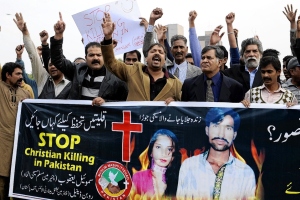Engage, a nonprofit based out of Islamabad, Pakistan, has launched a new campaign seeking to challenge the legality of the country's notorious blasphemy laws, which have caused the deaths and unjust imprisonment of scores of people.
The group, which is made up of religious academics, lawyers, a psychologist and development sector professionals, hopes to raise $2,500 to help "deconstruct religious law through a framework that is not alien to its defendants and open dialogue through channels that have credence within the system."
The campaign was initially launched for a client of Engage, who is facing the death penalty after being charged with blasphemy accusations. While the group is hoping to receive a waiver of the death penalty for their client, they are more specifically fighting a complete narrative of hate and persecution.
"The law...holds that anyone convicted of the offense of blasphemy against the prophet Muhammad is to be awarded a fixed death penalty, with no possibility of a pardon or waiver," the CrowdDefend campaign website reads.
The group notes that oftentimes, the laws are used to reinforce the oppression of groups and individuals that are already marginalized -- particularly Christians, who make up just 4% of the country's population.
"The reality of living under the blasphemy laws is this: as a Christian, for an alleged blasphemous utterance in a casual conversation with a friend, you can expect the death sentence, and also the torching of over a hundred homes in your Christian community by mobs," the group reveals. "The reality is Pakistan today is scary - Minors and the mentally disabled are being charged. Muslim judges who acquit Christians of blasphemy are being assassinated. Vigilante groups are torturing and murdering anyone who is so much as rumored to have desecrated the Quran."
The group adds that since the introduction of the more stringent form of the law, blasphemy accusations increased by a shocking 17500 %.
"This staggering increase in the number of individuals accused of the offence shows that the law has been used as a tool of persecution and oppression," the group notes. "People did not simply become dramatically more 'blasphemous'. Rather, these numbers show that the blasphemy law has been understood to be a viable legal means to target groups and individuals, and has been used as such."
As reported by the Gospel Herald, the Lahore High Court recently upheld the death penalty of Asia Bibi, a Christian mother-of-five who was convicted of blasphemy.
She was sentenced in 2010, a year after she was accused. Bibi was harvesting berries with a group of Muslim women, who accused her of drinking from the same water bowl as them. Following an argument, the women told a local cleric that Bibi had blasphemed against Islam.
Last November, a Pakistani mob beat to near-death a Christian and his pregnant wife for her alleged 'blasphemy', then threw them both into the large kiln where they both worked as bonded laborers, according to the World Watch Monitor.
In September, a Christian man was arrested on charges of blasphemy after his business rival, a Muslim, claimed in a police complaint that he defiled the name of the Muslim prophet Muhammad. The complaint was lodged after the Christian man got a contract for building material that complainant had also applied for, according to a report by a local group, The Voice Society.
Last month, Katrina Lantos Swett, chairperson of the United States Commission on International Religious Freedom, and her fellow commissioner, Mary Ann Glendon, visited Pakistan and released a report detailing the country's strict interpretation of blasphemy laws.
"There is a rising tide of religious persecution by the state and by militants," the report said, adding that the South Asian country's blasphemy law grossly abuses human rights. "The commission is aware of almost 40 people on death row or serving life sentences for blasphemy, a statistic unmatched in the world. The law fosters violence against religious minorities, such as Christians, Hindus and Ahmadis."

















